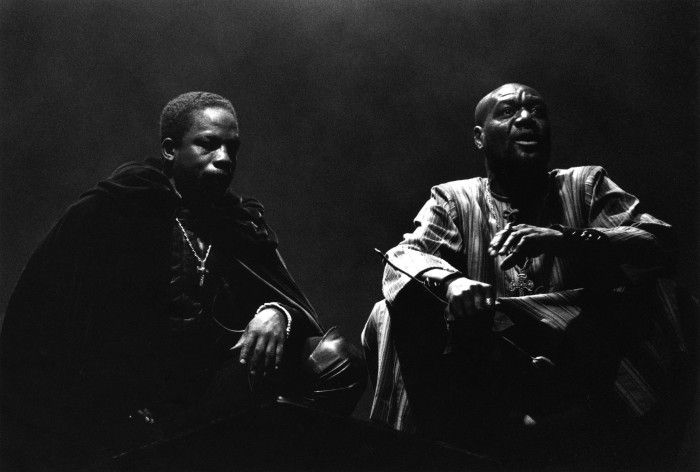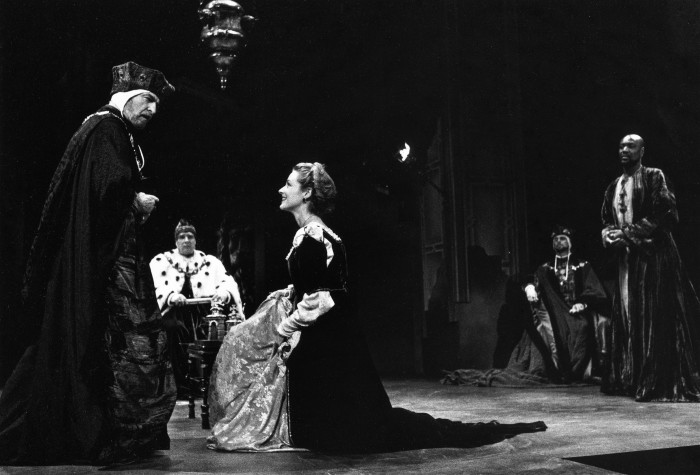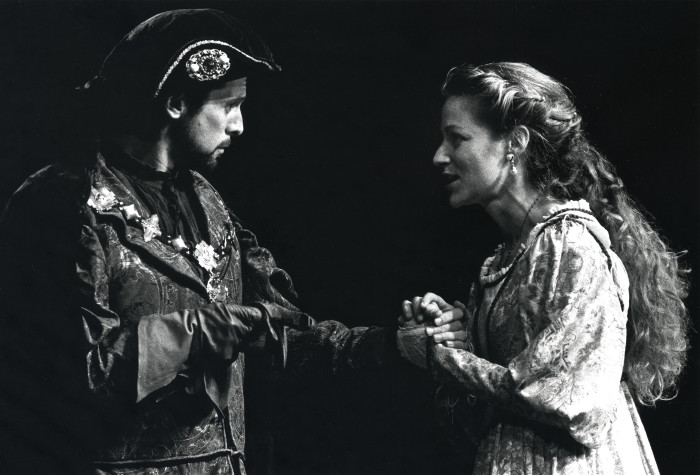



Excerpts from the reviews
“A clear and astonishingly believable production by Harold Scott . . . He creates visually stunning moments . . . Delroy Lindo is incandescent. “ – Marianne Evett, The Cleveland Plain-Dealer
“Scott’s ‘Afrocentric’ concept has virtually no impact . . . Delroy Lindo is imposing and entirely credible as Othello . . . but you’d never suspect hearing his rendition that the play contained a single line of poetry. . . As Desdemona, Olivia Birkelund shares in this prosaic quality . . . The rest of the cast is competent enough. . . . The costumes, while rich-looking, are cumbersome and awkward, causing the actors to constantly hike them up, step on them or kick them out of the way . . . I haven’t seen so much swirling, flipping, and flaunting of capes since my last bullfight.“ – James Damico, The Cleveland Free Times
Context
Program note from director Harold Scott:
“From the Directors Notebook.
My first experience with Othello was when I was invited to play the title role as a guest artist at the University of Connecticut more than 20 years ago. Some things have haunted me about the play ever since; and others have been clarified or resolved. The most resounding problem for me, as it has been for scholars and actors for centuries, is why does Othello believe Iago? Over the 20-odd years, I have researched and studied ideas for a solution. This Afrocentric production, sometimes known as “The Moor’s Othello” has been the outcome of my search.
Research taught me that in 15th-century Spain, Ferdinand and Isabella decreed that any Moor who did not convert to Christianity be banished from the country. Many returned to Africa. And others migrated to Italy. So while Shakespeare’s text and all Eurocentric scholars would imply that Othello was the only Moor in town, this in fact was not true. And if Othello and Iago came from the same culture, the likelihood of trust is far greater.
I then discovered that among the many Moorish tribes, there was an ancient nomad tribe called the Tuaregs. As I read more about them I became fascinated. The Tuaregs are a matriarchal society; the wife chooses the husband. If the husband is unfaithful, the wife may divorce him. If the wife is unfaithful, she must be sacrificed. These sociological facts totally support Shakespeare’s text. Othello says of Desdemona: “ . . . for she had eyes and chose me” (III, 3). Likewise Othello says to Desdemona, moments before he kills her: “ . . . thou dost stone my heart / and makest me call what I intend to do a murder / which I thought a sacrifice” (v, 2).
So with these and many other historical, anthropological and sociological facts to support me, I began to construct the off (or pre-curtain) relationships that have become the foundation for this Afrocentric (rather than Eurocentric) production of Othello. Othello, Iago and Emelia are all Tuaregs in my eyes. If all three are from one culture, it makes the extreme closeness of their interpersonal relationships far more credible.
My most fascinating and difficult task to date has been to solve the psychological motivations for both Iago and Othello. For me this is an autumnal play. Othello describes himself as “ . . . declined into the veil of years / yet that’s not much” (III, 3). This seems to place Othello right in the middle of a midlife crisis. So the play becomes about a man in his middle 40s who has fallen head over heels in love for the first time in his life. A 40-something confirmed bachelor and lifetime military man who permits himself to fall in love and marry a young woman 20 years his junior is a prime candidate for problems.
Iago described himself as 28 years old, saying “I have looked upon the world for 4 times 7 years . . .” (I, 3). This reference is often cut or makes no sense when you have an actor such as Christopher Plummer or Frank Finlay playing the role. If one observes the ages as Shakespeare gives them to us, there is the potential for a strong mentor/student or even father/son relationship.
At the outset of the play we learned that Iago has been passed over for a promotion by Othello. The job has gone to Michael Cassio, a young man with much book learning but no in-the-field experience. Add this to the chemistry of great love and honesty attributed to Iago and Othello before the plays begins – and you have a situation set up for betrayed love.
– Harold Scott”